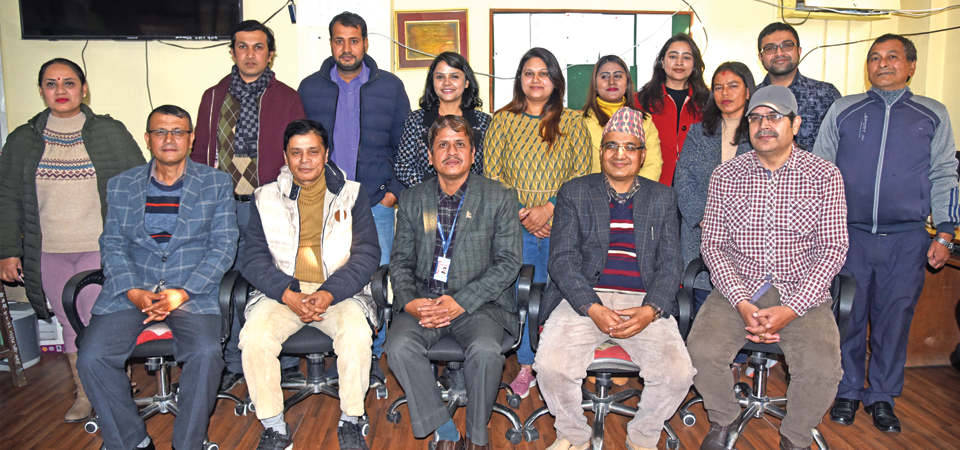A Reader Recalls How TRN Boosts His Career

Parmeshwar Devkota
As the oldest existing English daily, The Rising Nepal has become a credible source of information for the English-speaking readers living inside Nepal. TRN served as a viable means of communication with foreign readers as the country had moved on the path of modernisation and development more than five-five decades ago.
In addition to contributing to quality English journalism, TRN was instrumental in enhancing the English language standards in Nepal, benefiting the people involved in different occupation. Students, teachers, bureaucrats and professionals largely relied on TRN to enhance their English language that has been widely spoken all over the world.
When English language was still confined to a handful of elite, TRN came in handy for those who had earned higher education but lacked English writing and reading skills.
Setting Standards
Jayaram KC, retired teacher from Nuwakot district, gives credit to TRN for his successful teaching career. KC began his career as a teacher after completing his matriculation that is an equivalent to School Leaving Certificate (SLC) some fifty years ago. Then he obtained bachelor’s degree in education and appointed as English teacher in a public school in Kathmandu. That time there was a dearth of English teachers so he was assigned to teach English at secondary level. But he did not know to read and write English so he searched for institutes to learn English in capital city.
One day as he was coming home via Thamel, he saw The Rising Nepal at a bookstore at Shorhakhutte in Kathmandu. It was a serendipitous encounter with the English daily that would bring a positive change to his teaching profession. He subscribed TRN and used it to hone his English writing skills.
“After starting reading the English daily, I came to know about many nuances of English, helping raise his level of confidence. I used to jot down the unfamiliar words from the articles and news and learned to write sentences,” recalled the septuagenarian.
KC soon became popular among the students and teachers of school owing to his good English. “TRN enabled me to be a respected member of society,” he said. He taught his students and the people of his locality well. He trained them how to be happy in life, how to dine. KC taught moral lessons to the students and human values to the locals at Jhor in Nuwakot.
On the 56th anniversary of TRN, he requested for starting a special column on English grammar and syntax, which would boost the reading and writing skills of the readers, at least once in a week, in its Friday Supplement. Unlike in the past, today there are many advanced English medium schools and institutes to impart education through English so there is no need for TRN to offer materials for the English learners.
Challenges
Now TRN stands to deal with challenges facing newspapers nationally and globally. Finding an appropriate news items, presenting it impartially, spreading paper’s circulation, shrinking revenues and embracing cutting-edge technology are its new challenge. Now it should be digitally transformed. Today, the young generation is highly influenced by the internet-fuelled journalism. The social network communicators and bloggers disseminate news within minutes to a large number of readers and audience. The news they publish or air contains colour, sound, exact location and people’s concerns.
But, the problem with the internet-based media is that the news they disseminate in some cases are misleading. Neither can it be filed like newspapers. So, the people like KC, who are not versed in the modern technological know-how, prefer reading newspapers. If we provide novelty in the news, and incorporate personal touch, it will certainly draw readers’ interests and passion. Stories of human concern as hygienic food, healthy behaviour, and exercise can increase the newspaper’s readership. As KC said, it should have eye-catching layout that draws the readers’ attention in first sight. After all, first impression is the last impression.
(Devkota, deputy executive editor, heads news desk)
Recent News

Do not make expressions casting dout on election: EC
14 Apr, 2022
CM Bhatta says may New Year 2079 BS inspire positive thinking
14 Apr, 2022
Three new cases, 44 recoveries in 24 hours
14 Apr, 2022
689 climbers of 84 teams so far acquire permits for climbing various peaks this spring season
14 Apr, 2022
How the rising cost of living crisis is impacting Nepal
14 Apr, 2022
US military confirms an interstellar meteor collided with Earth
14 Apr, 2022
Valneva Covid vaccine approved for use in UK
14 Apr, 2022
Chair Prachanda highlights need of unity among Maoist, Communist forces
14 Apr, 2022
Ranbir Kapoor and Alia Bhatt: Bollywood toasts star couple on wedding
14 Apr, 2022
President Bhandari confers decorations (Photo Feature)
14 Apr, 2022











